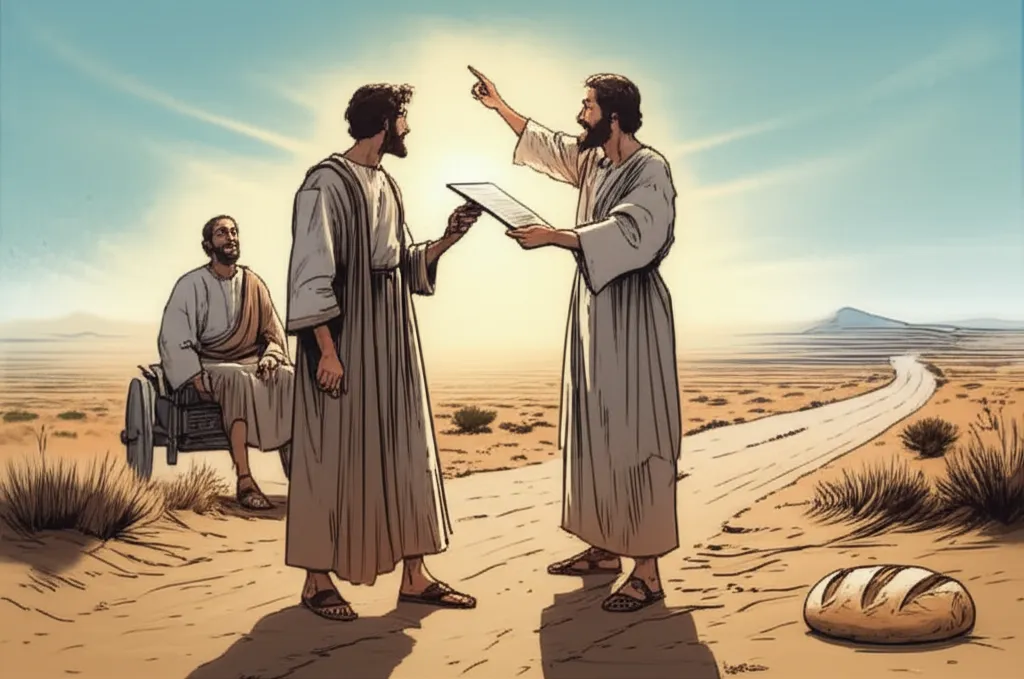The journey of faith is often a solitary one, yet it is in encountering others that our understanding deepens and our spirits are ignited. Today's readings offer a powerful illustration of this truth, reminding us that divine encounters often occur in the most unexpected places and through the most unlikely individuals. They challenge us to consider how we engage with scripture, how we respond to the call of the Spirit, and how we share the transformative power of faith with those around us.
An Encounter on the Road
The first reading from Acts (8:26-40) tells the story of Philip and the Ethiopian eunuch. This passage is rich with layers of meaning. The angel of the Lord directs Philip to a desert road, a seemingly barren place, yet it is there that he encounters a man of great importance, a court official of the Ethiopian queen. This reminds us that God's presence is not confined to sacred spaces or grand events; He is present in the ordinary, in the everyday encounters that shape our lives.
The eunuch, despite his high position, humbly admits his need for guidance in understanding the scriptures. "How can I," he asks, "unless someone instructs me?" This is a powerful reminder of our shared human condition. We are all, in some way, seeking understanding, searching for meaning in the sacred texts. It is through dialogue, through the sharing of knowledge and experience, that we come to a deeper appreciation of God's word. Philip, guided by the Spirit, opens the scriptures to him, revealing the truth of Jesus Christ. This act of interpretation is crucial. It highlights the importance of engaging with scripture not merely as a historical text, but as a living word that speaks to our present circumstances.
The eunuch's immediate desire for baptism upon understanding the Gospel is a testament to the transformative power of faith. He doesn't hesitate; he recognizes the truth and embraces it wholeheartedly. This should challenge us to examine our own response to the Gospel. Do we embrace it with the same fervor and conviction? Are we willing to take the necessary steps to live out our faith authentically?
The Bread of Life
In the Gospel reading (John 6:44-51), Jesus declares, "I am the bread of life." This profound statement builds upon the earlier miracle of the loaves and fishes, offering a deeper, spiritual understanding of nourishment. Jesus is not simply providing physical sustenance; He is offering Himself as the source of eternal life.
He says, "No one can come to me unless the Father who sent me draw him." This can be a challenging concept. It speaks to the mystery of divine grace, the understanding that our ability to believe is itself a gift from God. It is not through our own merit or effort that we come to Christ, but through the Father's invitation. This understanding should inspire humility and gratitude in our hearts.
Jesus contrasts the manna in the desert, which sustained the Israelites physically but could not prevent death, with the bread that He offers, which leads to eternal life. This is a radical claim, one that challenges our understanding of life and death. It invites us to consider what truly sustains us, what nourishes our souls and gives us hope for the future. The promise of eternal life is not simply a reward for good behavior; it is a participation in the very life of God, a union with Christ that transcends the limitations of our earthly existence.
Echoes of Wisdom
Reflecting on these passages, we can draw inspiration from those who came before us. Consider the emphasis on ethical and social justice, a call to moral responsibility and care for the marginalized. Philip's willingness to engage with the Ethiopian eunuch, a foreigner and an outsider, exemplifies this commitment. It reminds us that our faith calls us to reach out to those on the margins, to offer them understanding, compassion, and the hope of the Gospel.
We can also find inspiration in the allegorical and mystical interpretations of scripture. The image of Jesus as the "bread of life" is not simply a literal statement; it is a profound symbol of spiritual nourishment, a reminder that our souls need sustenance just as our bodies do. This invites us to delve deeper into the scriptures, to seek the hidden meanings and the spiritual truths that lie beneath the surface.
Finally, we are reminded of the complexities of human nature and divine grace. The understanding that we are drawn to Christ by the Father's invitation speaks to the mystery of God's love and our own free will. We are not simply puppets in a divine drama; we are active participants in our own salvation. God offers us the gift of faith, but it is up to us to accept it, to nurture it, and to live it out in our daily lives.
A Call to Action
These readings challenge us to be open to encountering God in unexpected places, to be willing to share our faith with others, and to embrace the transformative power of the Gospel. Let us strive to be like Philip, guided by the Spirit, ready to offer understanding and hope to those who are searching. Let us also be like the Ethiopian eunuch, humble and open to learning, eager to embrace the truth when we find it. And let us never forget that Jesus is the bread of life, the source of eternal nourishment, who sustains us on our journey of faith. May we all cry out to God with joy, praising Him for His unwavering kindness and love. (Psalm 66:8-9, 16-17, 20)
